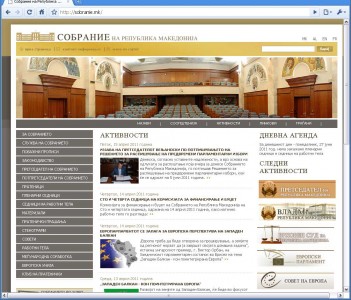This post is part of our special coverage Macedonia Protests 2011.
The newly-elected Macedonian Parliament held its initial session on Saturday June 25, 2011. The composition of this Assembly indicates the culmination of the trend for centralization of power among a decreasing number of political actors, promising “more of the same” kind of politicking from the last few years.
Macedonia's population is about 2 million people, who are represented by 123 members of parliament (MPs). The number of seats in the Parliament does not result from a straight proportion based on the popular vote. As Global Voices has explained before, the electorate is divided across nine electoral constituencies, and some votes count more than others. After counting of votes, the seats get distributed according to D'Hondt method.

On Monday, June 27, on the third day since the new Parliament was formed, its website has not informed about its constitution yet. In fact, the latest news is 2 months old.
The results of the June 5 elections were confirmed by the international community: the incumbent parties VMRO-DPMNE and DUI won the most votes, the former in “the ethnic-Macedonians-and-others block,” the latter in “the ethnic Albanian block.” They are slated to form the Government again.
It turned out that out of 18 political parties/coalitions that participated in the elections, only 5 have entered the Parliament:
- The ruling VMRO-DPMNE and its partners (ethnic Macedonian, Roma, Vlach, Turkish, Serbian, and Bosniak parties) won 56 seats (7 fewer than in the previous elections, even though they won the three additional diaspora seats).
- The oppositional SDSM and its partners (ethnic Macedonian, Roma, Vlach, Turkish, Serbian, and Bosniak parties) won 43 seats (an increase of 15 seats compared to the previous elections).
- The ruling DUI (ethnic Albanian) won 15 seats (3 fewer)
- The oppositional DPA (ethnic Albanian) won 8 seats (a decrease of 3 also).
- The newly-formed National Democratic Revival (or Rebirth, also ethnic Albanian) won 2 seats.
Zharko Trajanoski wrote [mk] about “the biggest losers”:
- VMRO-People's Party (VMRO-NP) won 28,217 votes and zero MPs.
- New Democracy won 19,958 votes and zero MPs.
- United for Macedonia (OM) won 17,081 votes and zero MPs.
- Liberal-Democratic Party (LDP) won 16,551 votes and zero MPs.
- Political Party Dignity (PPD) won 8,837 votes and no MPs.
These five parties have won over 90,000 votes and in reality should “weigh” ten deputies. If we had one electoral constituency [instead of nine], VMRO-NP would have won 3 MPs, New Democracy – 2 MPs, OM – 1 MP, LDP – 1 MP also, and Dignity would have nearly missed winning a seat. Therefore, around 106,000 votes went blank, for parties that are not represented in the Parliament. The big fish won eat the smaller fry, and won at least 11-12 MPs more than they were due. I say “at least” because the National Democratic Rebirth got 2, even though its “weight” in votes is 3 MPs.
All these “losers” could have been winners if they had made their own coalition or entered the existing coalitions. Macedonian electoral model, for the smaller parties, promotes the slogan “Enter a Coalition or Disappear!”
As announced via Global Voices, the people demanding justice and an end to police brutality greeted the old-new MPs with a protest that embraced the Parliament.
This post is part of our special coverage Macedonia Protests 2011.







3 comments
The new Government of VMRO-DPMNE and DUI will represent only 47,86% of voters.